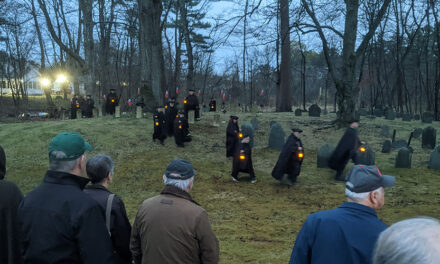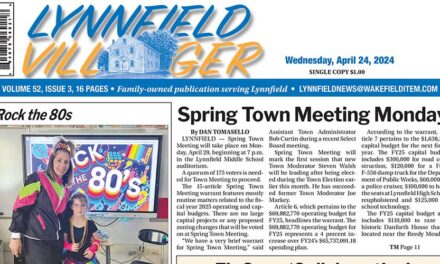Publishing September 11, 2019
By DAN TOMASELLO
LYNNFIELD — A warrant article for the Sept. 26 Special Town Meeting that seeks to allocate funds for the Wakefield-Lynnfield Rail Trail’s final design is moving forward without the support of the Board of Selectmen.
The Friends of the Lynnfield Rail Trail submitted a citizens’ petition last month requesting a Special Town Meeting in order to appropriate $348,000 to cover the $10 million rail trail’s final design engineering costs. There are no other articles appearing at the Special Town Meeting, which will be held on Thursday, Sept. 26, beginning at 7 p.m. in the Lynnfield Middle School auditorium.
Locksley Road resident Patrick Curley made the case for allocating town funds for the rail trail’s final design during Monday’s Board of Selectmen meeting. He said WorldTech Engineering informed the Friends the rail trail’s final design will cost $695,000, which would be split between Lynnfield and Wakefield.
“That is where we came up with the $348,000 figure,” said Curley.
Curley said the Friends of the Lynnfield Rail Trail are looking for the town to appropriate the $348,000 for “a number of reasons.”
“The Massachusetts Department of Transportation pays for the construction of the rail trail, but towns pay for the design,” said Curley. “Contributing money for the design shows our readiness factor in terms of MassDOT moving forward with construction.”
Curley recalled that the town was awarded a $100,000 reversible grant from the Massachusetts Department of Conservation and Recreation last year, which he said would reduce the final design price tag to $248,000.
“That grant expires on July 1, 2020,” said Curley. “The reason why we have got to move forward is we don’t want to risk losing the $100,000 DCR grant.”
Curley noted state lawmakers were able to secure a $500,000 earmark for the rail trail’s final design into the Environmental Bond Bill signed into law last year. After discussing the earmark with representatives from state Sen. Brendan Crighton and state Sen. Jason Lewis’ respective offices, Curley said the Friends believe “there is very little hope the town will see those funds from the state.”
“Even if the state came up with $500,000, if you divide it in two, that is $250,000 for each town,” said Curley. “That is not enough to pay for the final design. We would still be short by about $100,000 and we would have to go back for another vote. The Board of Selectmen cannot rely on state funds materializing.”
Curley also said appropriating funds for the rail trail’s final design could potentially expedite construction of the project, which is currently slated for 2023-2024.
In closing, Curley urged the selectmen to follow in the Finance Committee’s footsteps and support the rail trail warrant article.
“We have got a mandate from Lynnfield voters,” said Curley. “Voters voted for the rail trail during the 2017 April Town Meeting and also in the 2019 Town Election. Delay means another generation loses out on a trail. The voters I have spoken to want this rail trail and they are tired of more and more votes and questions. They want to resolve it and we can do that at this Special Town Meeting.”
The debate continues
After Curley concluded his presentation, rail trail supporters and opponents carried on their tradition of sparring about the project.
Trickett Road resident Wayne Perry inquired why the Friends decided to request a Special Town Meeting instead of submitting a warrant article for October Town Meeting.
“The Friends of Lynnfield Rail Trail thought about the options and in talking with constituents and voters, there was a strong desire for a Special Town Meeting to focus on a single issue,” said Curley. “That is why this was brought as a citizens’ petition article.”
Perry accused the Friends of wasting taxpayer money by holding the Special Town Meeting, which will cost between $7,000 and $9,000.
“This is the standard process for democracy in our town,” said Curley in response. “We exercised our rights as citizens to move for a Special Town Meeting. I am proud to live in a town where democracy prevails.”
Westover Drive resident Jim Gerace accused the Friends of voter suppression by holding the Special Town Meeting.
“A Special Town Meeting means seniors won’t show up as much as they would and others won’t show up as much,” said Gerace. “It gives the pro rail trail people the opportunity to pack the audience so it has a better chance of passing.”
Merservey Lane resident Stephen Sorrentino said the $348,000 should be appropriated for the town’s schools and public safety departments instead of a rail trail.
“I take exception to taking money out of town funds for something I would consider to be more of a luxury item,” said Sorrentino.
Todd Lane resident Keith Nobil said the rail trail would “help the health of our town.”
“It’s not a want,” said Nobil. “It’s a need. If you build a rail trail, it would give individuals in town a place to go to keep themselves healthy.”
In response to a question from Nobil, Town Administrator Rob Dolan said the rail trail’s final design would be paid for by funds in the town’s Sale of Real Estate Account and the Overlay Account if the warrant article passes. He said there is $2,000,754 in the Sale of Real Estate account and $1,040,265 in the Overlay Account.
“These funds can be used for one-time uses that would otherwise be bonded or borrowed for capital projects,” said Dolan.
Summer Street resident Stephen Fantone said he sent his children to private schools but said he still wanted the town to have a strong public school system. He is a supporter of the library even though he doesn’t use it.
“To have a full, rich community, we need to have a diversity of offerings for people,” said Fantone. “I am not going to be a personal beneficiary of a rail trail, but I will walk on it if it gets built. I think it enriches the town. This is an asset worth having.”
Selectmen express opposition
After rail trail supporters and opponents continued their ongoing debate, the Board of Selectmen came out against the warrant article.
Before the votes were finished from being tallied in the April Town Election, Selectmen Chairman Phil Crawford said House Minority Leader Brad Jones (R-North Reading) sent him a text message asking what transpired with the vote “because he was ready to go to the state to ask for the $500,000 put into the Environmental Bond Bill.” He said Jones and Crighton are working to secure those funds for the town.
“We have been told that this money will most likely get done in the next funding round,” said Crawford. “For a town the size of ours, it would be much more prudent for the town to wait and see if the funding comes at the end of this fiscal year.”
Crawford also said the Friends can reapply for the $100,000 DCR grant once funds included in the bond bill are released. He said the state might release the full $500,000 or it could be less.
“It would be much more prudent to see what we get from the state and then know how much we have to raise,” said Crawford.
Selectman Dick Dalton agreed.
“I don’t see the sense of urgency when this is slotted for 2024,” said Dalton. “I think the argument that this needs to be done right now falls short. I think we need to wait and see. The governor has been very supportive of the rail trail concept. He is a Republican and our representative is the minority leader. I think we have a very good chance to get state funding.”
Dalton also took issue with several rail trail opponents accusing the Recreational Path Committee of being biased.
“They have done a remarkable job,” said Dalton. “There were times the proponents weren’t happy with them and there were times the opponents weren’t happy with them.”
After the discussion, Crawford and Dalton voted to not recommend the warrant article. Selectman Chris Barrett recused himself from the vote because his sister lives in close proximity to the rail trail.




